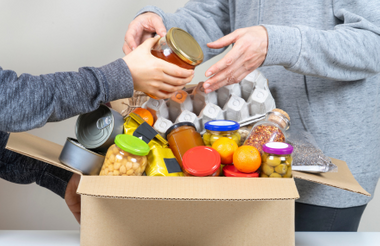Food poverty charities are being made to compete with each other for resources as demand from their beneficiaries increases, FareShare’s chief executive has warned.
Speaking to Civil Society, George Wright said that high demand for food driven up by the cost-of-living crisis and the inability of supply to keep up means that “everybody’s chasing the same volume”.
He praised the “fantastic job” of charities working to tackle food poverty in the UK, but said that more collaboration between them was needed.
“We need the food industry to come together because the demand is so great and so much greater than supply that the only way we’re going to get near making improvements is [by working] together,” he said.
‘We shouldn’t be trying to take it off each other’
FareShare works with the food industry to redistribute surplus food to a network of around 8,500 charities and community groups in the UK. Last year, the charity redistributed food sufficient for 128 million meals.
Wright, who previously worked at retailers including Marks & Spencer and Tesco before joining FareShare last summer, said “there is some level of collaborative working” among food charities but that it is a “very complex picture”.
“It’s quite competitive and competition means that you expend resources, trying to get access to the food. Everybody spends their life trying to get access to food and funds which is really intense. We shouldn’t be trying to take it off each other,” he said.
“The food that we get comes from 725 partners so it’s incredibly complex and all of the other charities will be liaising with the same people. It’s less about bad behaviour and more about the way the system is set up.
“What we need is more collaboration. If supply and demand were more balanced that wouldn’t be an issue. But it isn’t: there’s way more demand, which is double or treble what we all do.
“There are lots of charities on the waiting list and everybody wants to grow, rightfully.”
Food Foundation: ‘We have a national crisis of food security’
Anna Taylor, executive director of the Food Foundation, said that there is a “national crisis of food insecurity in the UK, which has deepened significantly in the last two years”.
“It’s not surprising that charities find themselves competing for scarce resources to serve their communities,” she said.
“The crisis cannot and should not be solved by tapping into more and more food surplus – though that is clearly a very sensible strategy for tackling food waste and reducing the damage the food system is wreaking on our environment.
“What we need is a proper government-led plan to tackle food insecurity which starts with ensuring people on the lowest incomes can afford to eat nutritious food, and ensuring all children, whatever their background, are fed well during the school day.”
City Harvest: ‘We’re keen to develop additional ideas on how to coordinate more’
Sarah Calcutt, CEO of City Harvest, said: “Almost 10 years ago, City Harvest was founded on collaborative principles – we exist to serve hundreds of community charities, ensuring that rescued, surplus food, is delivered for free.
“We’re collaborating in many ways already and we’re keen to develop additional ideas on how to coordinate more. Our only enemies are hunger and waste.
“Our work with the Xcess network, which includes several FareShare partners, is a great model of ensuring that no good food goes to waste through collaboration and a joined-up approach to reducing hunger and protecting the planet.”
Calcutt added that City Harvest “would be delighted to host a symposium on how we might all be more effective, and more efficient and how, together, we can feed the ever-growing number of hungry people in the UK”.
Related articles












